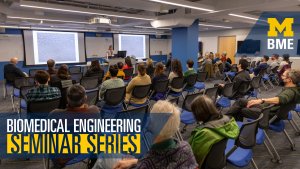Presented By: Biomedical Engineering
Magnetic Resonance Imaging for Models of Cardiac Performance
Biomedical Engineering (BME 500) Seminar Series - Daniel B. Ennis, Ph.D.

Abstract:
Medical imaging provides several opportunities to collect data for building patient-specific computational models of the heart. These models estimate performance variables that may not be measured directly (e.g., tissue stress and strain, hemodynamics, or electrical activity). Cardiac magnetic resonance imaging (MRI) can acquire time-resolved images that quantitatively encode structure, function, flow, and remodeling. This talk will summarize recent advances on how these MRI data are acquired and fused using computational models to produce microstructurally anchored measures of patient-specific cardiac performance.
Bio:
Daniel Ennis {he/him} is a Professor in the Department of Radiology at Stanford University. As an MRI scientist for nearly twenty-five years, he has worked to develop advanced translational cardiovascular MRI methods for quantitatively assessing structure, function, flow, and remodeling in both adult and pediatric populations. He began his research career as a Ph.D. student in the Department of Biomedical Engineering at Johns Hopkins University during which time he formed an active collaboration with investigators in the Laboratory of Cardiac Energetics at the National Heart, Lung, and Blood Institute (NIH/NHLBI). Thereafter, he joined the Departments of Radiological Sciences and Cardiothoracic Surgery at Stanford University as a postdoc and began to establish an independent research program with an NIH K99/R00 award focused on “Myocardial Structure, Function, and Remodeling in Mitral Regurgitation.” For ten years he led a group of clinicians and scientists at UCLA working to develop and evaluate advanced cardiovascular MRI exams as PI of several NIH funded studies. In 2018 he returned to the Department of Radiology at Stanford University as faculty in the Radiological Sciences Lab to bolster programs in cardiovascular MRI. He is also the Director of Radiology Research for the Veterans Administration Palo Alto Health Care System where he oversees a growing radiology research program.
Zoom:
https://umich.zoom.us/j/91375430500
Medical imaging provides several opportunities to collect data for building patient-specific computational models of the heart. These models estimate performance variables that may not be measured directly (e.g., tissue stress and strain, hemodynamics, or electrical activity). Cardiac magnetic resonance imaging (MRI) can acquire time-resolved images that quantitatively encode structure, function, flow, and remodeling. This talk will summarize recent advances on how these MRI data are acquired and fused using computational models to produce microstructurally anchored measures of patient-specific cardiac performance.
Bio:
Daniel Ennis {he/him} is a Professor in the Department of Radiology at Stanford University. As an MRI scientist for nearly twenty-five years, he has worked to develop advanced translational cardiovascular MRI methods for quantitatively assessing structure, function, flow, and remodeling in both adult and pediatric populations. He began his research career as a Ph.D. student in the Department of Biomedical Engineering at Johns Hopkins University during which time he formed an active collaboration with investigators in the Laboratory of Cardiac Energetics at the National Heart, Lung, and Blood Institute (NIH/NHLBI). Thereafter, he joined the Departments of Radiological Sciences and Cardiothoracic Surgery at Stanford University as a postdoc and began to establish an independent research program with an NIH K99/R00 award focused on “Myocardial Structure, Function, and Remodeling in Mitral Regurgitation.” For ten years he led a group of clinicians and scientists at UCLA working to develop and evaluate advanced cardiovascular MRI exams as PI of several NIH funded studies. In 2018 he returned to the Department of Radiology at Stanford University as faculty in the Radiological Sciences Lab to bolster programs in cardiovascular MRI. He is also the Director of Radiology Research for the Veterans Administration Palo Alto Health Care System where he oversees a growing radiology research program.
Zoom:
https://umich.zoom.us/j/91375430500